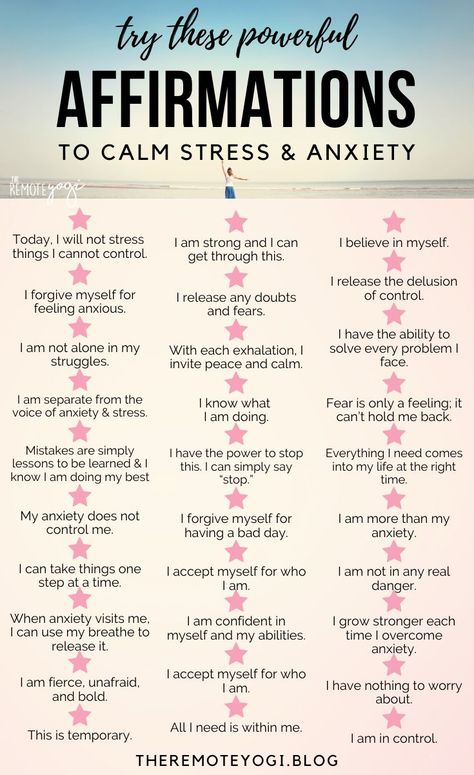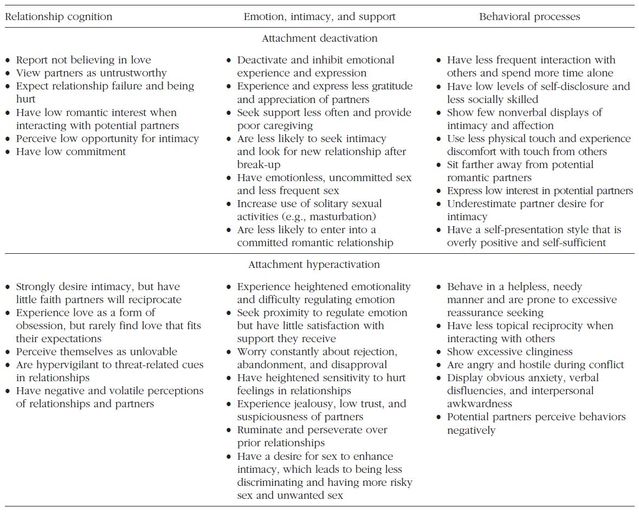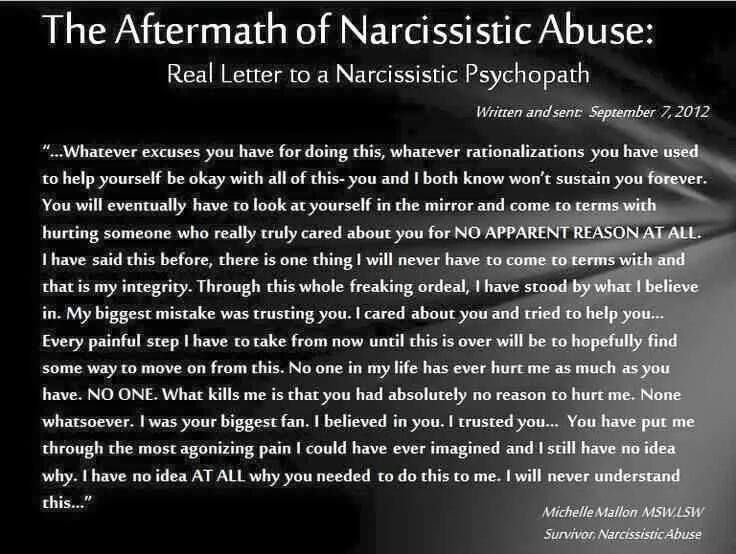Affirmation for anxiety
Reframing Your Worry to Calm Down
Affirmations are positive statements you repeat to promote change in your life and ease your distress. They can be useful in managing anxiety.
Using positive affirmations is like practicing positive self-talk. It can help you reframe your negative thoughts and focus on ideas and behaviors that lead to change.
You can create your own or find existing affirmations that speak to you. In either case, affirmations can become a useful tool to manage anxiety symptoms.
Here are a few positive affirmations for when you experience anxiety or to use regularly to manage anxiety symptoms in the long term.
To calm down quickly when you feel anxiety rising, try to repeat affirmations while you practice deep breathing or any other relaxation technique that works for you.
- “I am safe and in control.”
- “I have done this before, and I can do it again.”
- “This too shall pass.”
- “I am strong.”
- “I trust myself.
”
- “I am capable.”
- “I take things one day at a time.”
- “I inhale peace and exhale worry.”
- “This feeling is only temporary.”
- “I am loved and accepted.”
- “I am enough.”
- “Look at me go! I can do it all.”
- “I love myself.”
- “I forgive myself.”
- “I let go and I am free.”
- “I am doing the best I can and that is enough.”
- “I release the past and embrace the present.”
- “Wherever I go, I am well.”
- “I can handle whatever comes my way.”
- “I am safe and protected.”
- “I am safe.”
- “I am brave.”
- “I can move past this moment.”
- “I am in charge.”
- “As I breathe, I am calm and relaxed.”
- “I have survived my anxiety before. I will survive it now.”
- “My body is my ally.”
- “I act with confidence because I know what I am doing.”
- “I am different and unique, and that is OK.”
- “I am safe in the company of others.
 ”
” - “I love and I am loved.”
- “I am prepared and ready for this situation.”
- “People assume I can do this, I know I can, and I will.”
- “I like myself and that is enough.”
- “I am at ease when talking to other people.”
- “I enjoy doing this.”
- “I am good at everything I do.”
- “Day by day, minute to minute.”
- “I am capable and prepared.”
- “I let go of control and focus on joy.”
- “I am here, I am now, and I am well.”
- “I can handle anything that’s to come.”
- “I am safe in the here and now.”
- “I will handle whatever happens like I always do.”
- “I choose to see the beauty in my surroundings.”
- “I have time to prepare and decide.”
Positive self-talk and positive thinking have a direct effect on how you feel. A 2016 study, for example, found that replacing worrisome thoughts with positive mental images or positive affirmations helped people living with anxiety to worry less.
Another study from 2015 suggested that affirming yourself activates your brain’s reward system. The reward system causes you to experience a sense of pleasure and joy. It also reduces the experience of pain and worry.
A 2018 randomized controlled trial with mothers experiencing postpartum baby blues found that listening to positive affirmations and practicing relaxation techniques every day for 4 weeks offered the mothers significant relief from their symptoms.
Evidence from a U.S. national adult survey also found that practicing spontaneous self-affirmation was linked to a greater sense of:
- happiness
- hopefulness
- well-being
The report also found that self-affirmation, which focuses on your core values and self-worth, was related to feeling less angry or sad.
Research from 2015 indicated that under stress, your concept of self can constrict, which may impact your self-worth. Affirmations can help you reframe your thoughts from focusing on the aspects of the self that feel threatened when facing a challenge to the ones that may remind you that you’re capable and worth it.
In other words, affirmations help shift your focus from a problem and refocus on an extended vision of the self. This extended vision of who you are allows you to identify skills, experiences, and traits that make you capable of overcoming this and any other challenge.
Overall, using positive affirmations can help your emotional health by:
- decreasing stress
- improving confidence
- boosting overall mood
- focusing on solutions
- encouraging optimism
- boosting motivation
- helping you manage physical pain
- reducing fear
When using affirmations, you can:
- write them down a few dozen times in a notebook while focusing on their meaning
- record them and then play them back throughout the day
- write them down separately on sticky notes and tape them around your desk or home
- pick one and repeat it mentally a few times until you calm down
- pick one or more and repeat them aloud whenever you need
The start of your day and just before bedtime might be two of the best times to practice the affirmations.
Some people find it helpful to say their positive affirmations in front of a mirror or make it part of their daily meditation practice.
The more you repeat your affirmations, the more confident you’ll feel. Positive statements work because they lead you to focus on positive self-talk and thinking while leaving worrisome thoughts aside.
How to create your own affirmations
To create your affirmations, consider phrases that speak to you and feel natural and appropriate to your challenges.
It’s essential to choose words that feel believable so that you’ll trust they can happen.
When creating affirmations, it’s best to stick with a first-person perspective to provide a stronger connection to your sense of self and goals. That’s why affirmations usually begin with “I” or “my.”
Consider writing affirmations in the present tense as if what you’re saying is already a reality.
For example, instead of saying, “I will be successful,” you’d say, “I am successful. ”
”
You could also acknowledge your anxiety symptoms in your affirmations, but you’d add a positive twist.
For example, you could say, “I sometimes experience anxiety, but I can still achieve all of my goals.” Sometimes acknowledging your challenges can help you feel you can triumph over them.
Another idea is to speak to your core values to emphasize what’s important to you. This will boost your sense of self, improving self-esteem and self-empowerment when you repeat them.
For example, “I am noble and tolerant.”
Positive affirmations are statements you can use to decrease distress and focus on positive thinking. Research says they can help you feel more at ease.
When working with affirmations, you can write them down, repeat them aloud, or record them and listen to them throughout the day. Practicing relaxation techniques can make positive affirmations more effective for anxiety relief.
75 Positive Affirmations for Anxiety to Calm Your Mind
Laura Smith Updated: July 19, 2022 Yoga and Meditation
Contents
Anxiety can take its toll on you day to day and really impact on your self-esteem.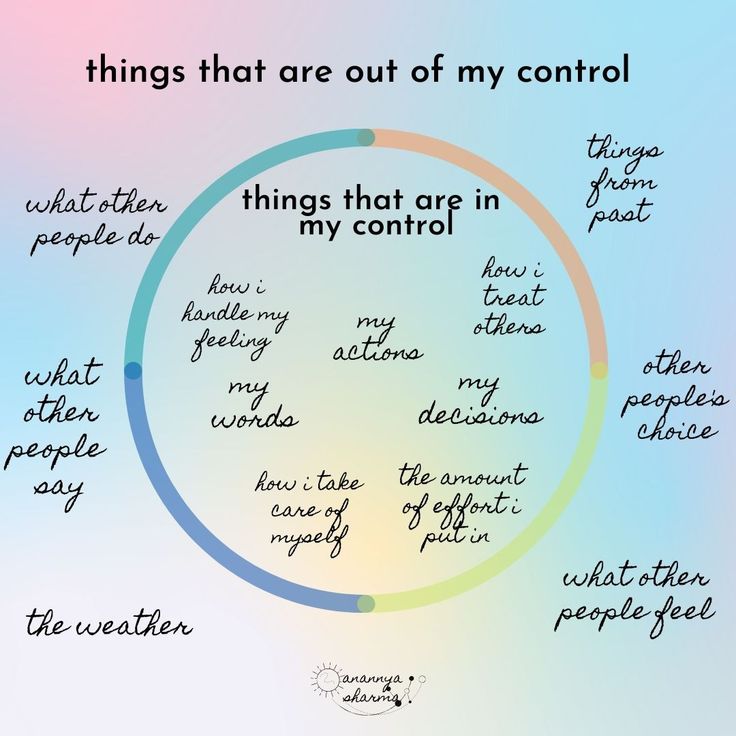
Start practicing daily affirmations and research shows you can teach your brain a new way to think about the world!
In this article we’ve compiled 75 positive affirmations to calm your mind and relieve your anxious thoughts.
Positive Affirmations for Anxiety
Positive thinking is powerful!
A 2016 study published in the National Library of Medicine, revealed that thinking positively can reduce worry in those with Generalized Anxiety Disorder.
Harness the power by practicing the below positive affirmations for anxiety:
1. The panic I feel will pass.2. I am strong and courageous.3. My thoughts and feelings are valid.4. Everything is temporary.Pin it for later!
Don’t forget to pin these positive anxiety affirmations for later!
5. I choose to be happy.6. I feel grounded in this moment. 7. I let go of what I can’t control.8. My anxiety doesn’t define me.9. I take things at my own pace.
7. I let go of what I can’t control.8. My anxiety doesn’t define me.9. I take things at my own pace.One way to slow down the pace of life is by practicing yoga.
There is much evidence to show that yoga can help relieve symptoms of anxiety.
In fact there is a series of poses that are particularly potent for those suffering from anxiety, depression or stress.
You can even recite yoga affirmations to put you in the headspace to get started!
10. I have the power to control my emotions.11. I will let go of negative thoughts.12. I have people willing to help me.13. I am not my thoughts.15. My future is filled with so many possibilities.- READ: 17 Best Yoga Poses for Anxiety (Depression and Stress)
Fear of the judgement and scrutiny of others can make even familiar social settings challenging for those with Social anxiety disorder.
Have these affirmations for social anxiety saved for when you need to give yourself a pep talk:
1. I am a great conversation starter.2. I have nothing to fear.3. Being unique is my strength.4. I’ve done this before. I can do it again.5. I’m not alone in how I’m feeling.You’re certainly not alone.
Statistics show that 15 million adults across the US suffer from Social anxiety disorder.
More than three in four people experience their first symptoms in childhood or during their teenage years.
6. I am an interesting person to be around.7. I am worthy of a happy life.8. I am enough.9. I belong here as much as anyone else.10. I don’t fear people’s judgement.- READ: Are Acupressure Mats Good for Anxiety?
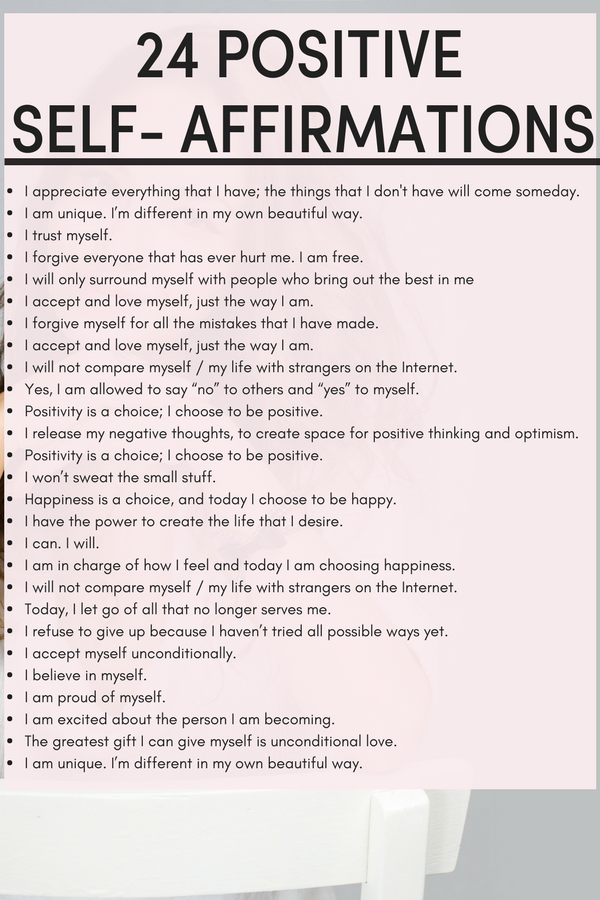 I can overcome my anxiety.2. I focus on what makes me happy.4. I fully embrace who I am.5. I can perceive any situation positively.6. I choose to think positive thoughts.7. I trust myself.8. I am worthy of good things.9.
I don’t dwell on the negatives.10. This might be hard, but I can handle it.
I can overcome my anxiety.2. I focus on what makes me happy.4. I fully embrace who I am.5. I can perceive any situation positively.6. I choose to think positive thoughts.7. I trust myself.8. I am worthy of good things.9.
I don’t dwell on the negatives.10. This might be hard, but I can handle it.- READ: 60 Positive Daily Affirmations to Boost Your Mood!
Morning Affirmations for Anxiety
Get your day started in the best possible way by reminding yourself what a strong person you are!
Here are 10 morning affirmations for anxiety relief:
1. I am a good person.2. I can rise to the challenge.3. I welcome happiness and joy into my day.Why not practice your morning affirmation as you enjoy a cup of herbal tea?
There are a number of blends, backed up by science, that have benefits for those living with anxiety.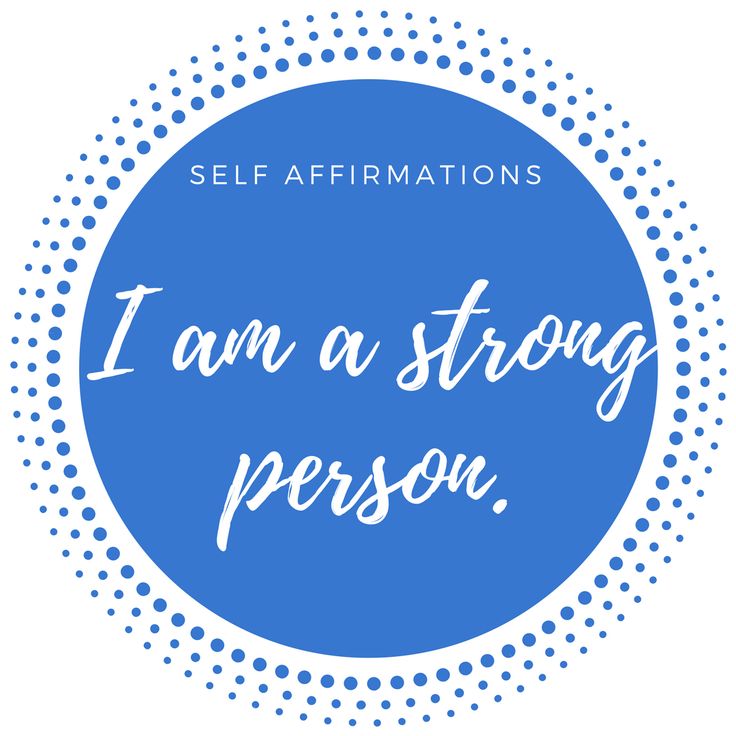
These include peppermint, chamomile and rosehip.
4. I am exactly where I’m supposed to be.5. I can choose my thoughts.6. I am capable of solving problems.7. Today will be a good day.8. I am not alone in my life.9. I know that everything will work out.10. I will let worry go.- READ: 9 Best Teas for Anxiety: Natural Remedies for Relief
Affirmations for Work Anxiety
The latest statistics show that 62% of adults in the workplace report high levels of stress.
Workload, people issues, lack of job security and juggling work and personal life were provided as causes.
1. I believe in my own abilities.2. I trust my own judgement.3. I am more than my job.Building your self-esteem and reducing worries is possible when you regularly meditate.
Sitting cross-legged may not seem like an effective treatment method, however experts explain that meditation teaches you how to experience your thoughts completely differently.
4. I can overcome any problem that comes my way.5. I am the right person for the job.6. Today I will celebrate every little win.7. I will embrace new opportunities.8. I’m allowed to say no.9. There are no mistakes, only lessons to be learned.10. I am grateful for all I have achieved.Showing gratitude each day is another way shown to curb anxiety.
Using a journal can be one way to create a habit of giving thanks.
- READ: Benefits of Meditation: 42 (Life-Changing) Reasons to Start Today
 3. Tomorrow is a new day.4. I have done enough today.
3. Tomorrow is a new day.4. I have done enough today.Going to bed early can be one way to calm your busy mind.
Enjoying a full night’s sleep can reduce feelings of stress, anger and mental exhaustion.
5. I am making myself a priority.6. I can fall asleep whenever I want.7. I choose sleep over anxiety.8. I am grateful for all I achieved today.9. I will recharge for tomorrow as I sleep.Living with anxiety can take its toll on your confidence.
You can give it a boost by going to bed naked! Yes, you read that correctly.
There is some evidence to show that sleeping naked makes you feel more comfortable in your own skin which results in greater confidence.
10. I let all the feelings of today just drift away.- READ: 23 Things to Help You Sleep Better Tonight (Evidence-based)
Self-Affirmations for Anxiety
You are more than your anxiety and it’s important that you keep reminding yourself of this fact.
Read our self-affirmations for anxiety and find the one that most resonates with you:
1. I am calm and at peace.2. Taking care of myself is very important.3. I have everything I need within me.4. I can slow my breathing. I am in control.5. I am enough.6. I give myself permission to take a break.Anxiety can be exhausting so making time for self-care is so important.
Due to the commonality of anxiety, the market is bursting with products to help treat the condition, so why not treat yourself?
7. I am kind to myself.8. I can always try again.9. I am learning to deal with my worries.10. I release any doubts and fears.Want even more inspiration?
We’ve compiled lists of affirmations for men, women and kids that you can explore to find the words that are right for you.
Sign-up for The Good Body mailing list and be the first to receive our latest news!
- Email*
Previous Chronic Pain Instagram Accounts and Influencers to Start Following NOW!
Next What is an Affirmation?
How to Stop Worrying: 12 Failing Strategies
43,588
BooksPractices how toAntistress
1. You're looking for validation
You worry that you don't look good enough and keep asking your partner, "Do you think I'm okay?" It seems to you that chest pain is the first symptom of cancer, and you often visit doctors to find out: “Will I live?” Or maybe you're nervous about a guy you met at a party. "He yawned, was he bored with me?" - ask your friend.
The problem is that one confirmation is not enough.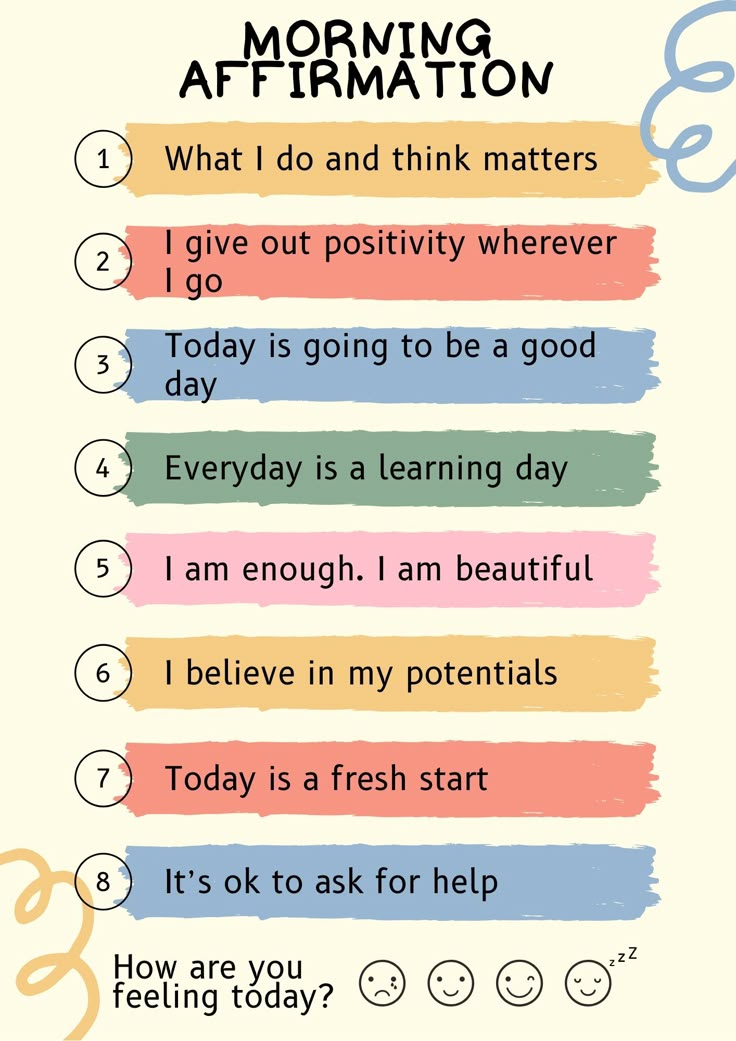 You will look for them again and again, trying to get more guarantees in order to reduce your anxiety and insecurity for at least the next couple of minutes. But no confirmation helps, because you will soon begin to doubt the confirmation itself.
You will look for them again and again, trying to get more guarantees in order to reduce your anxiety and insecurity for at least the next couple of minutes. But no confirmation helps, because you will soon begin to doubt the confirmation itself.
Maybe your friend is just encouraging you by saying that you look good, but in reality she thinks otherwise. Or the doctor can't tell for sure if it's cancer without doing certain tests. In doing so, you are trying to gain assurance, rather than learning to live with insecurity, which is a very important element in dealing with anxiety.
2. You are trying to stop thinking
You may have heard of stop thought therapy, which involves getting rid of negative or unwanted thoughts by suppressing them. Its essence is this. Every time you are worried that you will lose all your money in the stock market, you must force yourself to stop thinking about it, flick your wrist with a rubber band, or mentally shout to yourself: “Stop!”. This is supposed to reduce your nervousness.
This is supposed to reduce your nervousness.
Unfortunately, this method not only doesn't work, but it leads to "thought rebound" and only worsens the situation in the long run
Let's check the "stop thought". Close your eyes and relax. Imagine a clear image of a polar bear - cute and fluffy. Now that you have a vivid picture in your head, I want you to stop thinking about polar bears for the next ten minutes. No matter what you do, don't think about any polar bears. Psychologists have long noticed that attempts to suppress certain thoughts lead to their renewal or even intensification.
3. You gather information
When you're worried about something, you try to find out as much as you can about the problem. Knowledge is power, isn't it? After all, this is how we find out the facts. Perhaps you really collected a number of facts (or perhaps not). But even real facts can be selected biased, that is, on the basis of prejudice, and misleading.
This is what happens when you are looking for information to support your negative beliefs. You see a trend that doesn't exist, you overestimate the risk and give importance to what is unimportant. Trying to figure out if a negative prediction can come true - “What if I have cancer?”, You find the information you need and tend to confirm the prediction.
If you are worried that you are annoying someone, you will not only look for any signs that this person is treating you badly, but you will also interpret their neutral behavior as negative. Research shows that chronic neurotics view neutral or ambiguous information as a threat.
Shy people consider any complex facial expression to be angry
Psychologists have also found that when we gather information about a threat in a state of anxiety (for example, the possibility of a plane crash, a terrorist attack, or contracting a dangerous disease), we almost always overestimate the risk.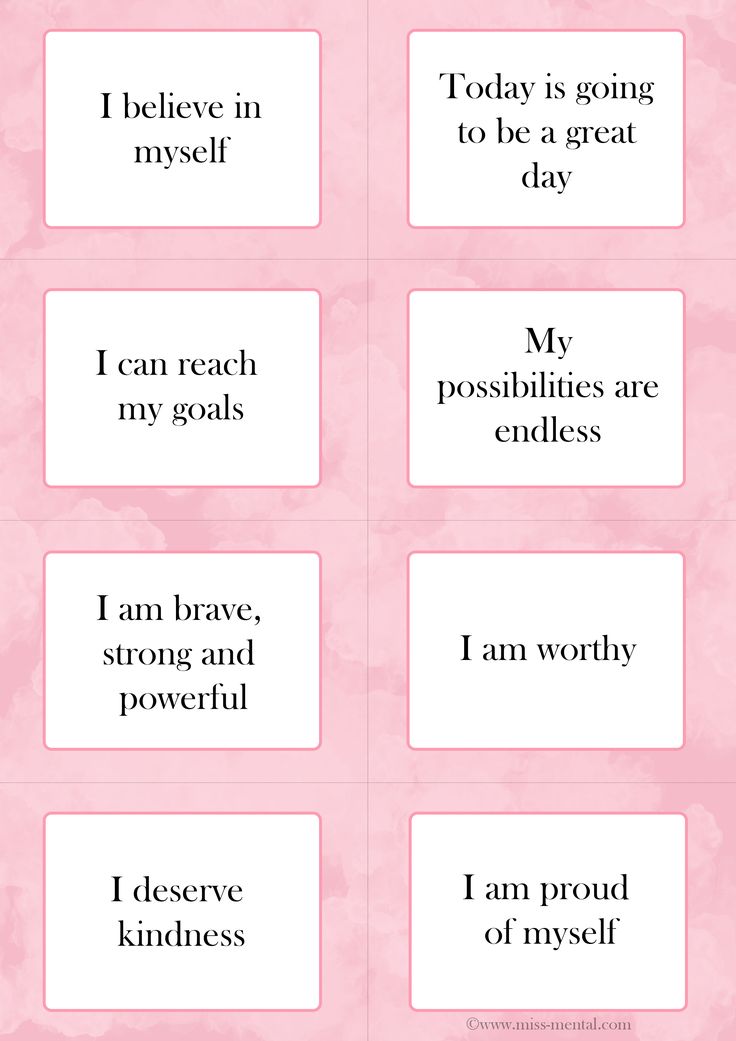
At times like this, we don't try to figure out the most important thing, which is, "How often does the worst thing NOT happen?" If you're afraid of flying, how carefully do you search for information about planes that land successfully? If you fear being fired, do you keep track of how many days/months/years you haven't been fired?
4. You check again and again
You try to reduce your anxiety by making sure everything is in order. You think: “I may have forgotten something”, “I must have missed something”, “If I can detect some little thing in advance, then I can prevent the worst” and “I should check everything, then (perhaps) I can do something.” The key points are as follows:
-
"If I figure everything out, I can reduce my uncertainty."
-
"I can't stand uncertainty."
-
"If I detect the signs of disaster early, I can prevent the worst."
-
"I can't rely entirely on my memory."
-
"Caution is never too much.
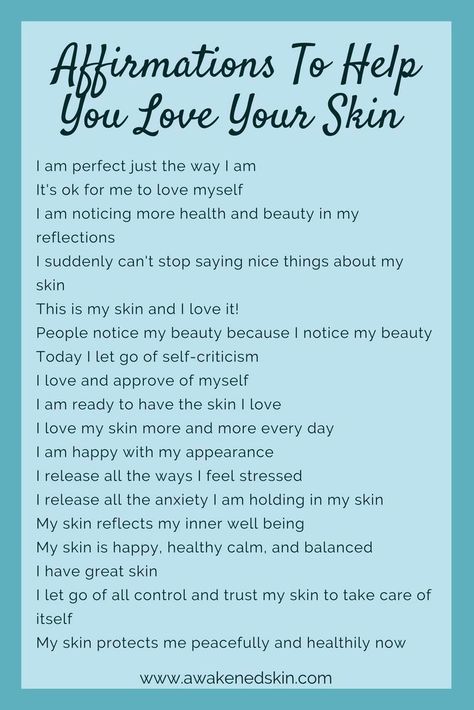 "
" -
"This is my responsibility."
You think you look terrible. Every time you think about it, you rush to the mirror to make sure your makeup is in order. You look at yourself in a magnifying mirror, which allows you to see any wrinkle or broken capillary in the eye. This, of course, makes you even more worried about your appearance.
You explain to yourself: “I look in the mirror to see something wrong early on and do something about it.” . This reduces anxiety: fixing your makeup makes you feel better for a while, and avoiding social events feels safer.
What you don't know is that going to a party would help you overcome your anxiety. Checking never addresses the root of your anxiety: "I can't stand being insecure." Checks cost you stress, time, and energy, and reinforce your belief that constant monitoring is necessary to feel safe. What about the meaning? For a period of five minutes to an hour you feel better, and then you need to make sure again.

5. You avoid discomfort
A common way to deal with anxiety is to avoid or put off what worries or worries you. If you're worried about taxes, you're avoiding filing your tax return. If you are worried that something is seriously ill, then put off going to the doctor.
Avoiding what bothers you works instantly. However, it also reinforces the belief that you are unable to solve these problems, making you even more afraid of facing them in the future. There is simply no way for you to know that you can handle it all on your own. You have no chance to disprove your negative beliefs.
6. You stun yourself with alcohol, drugs and food
Anxiety and depression are caused by the abuse of alcohol, drugs and food. If you're worried about losing your job, you overeat and drink a lot to calm down. If you're worried about getting pissed at a party, you can always "take a couple of drinks" to "relax."
Suppression of anxiety through drugs, alcohol or food indicates that you do not know how to deal with your anxieties and emotions.
You do not reflect, do not try to figure out how much your prejudices correspond to the truth.
The advantages of suppression and avoidance are that they work instantly and are easily accessible
And no consequences - for the next couple of hours. You will not feel bad until late, you will have a hangover tomorrow, you can enjoy drugs and not think about life in the real world, because your motivation and ambition have decreased significantly. However, you still do not resolve the existing issues. As a result, you will have two problems - anxiety and self-destructive behavior.
7. You suffer from "overpreparation syndrome"
You are nervous about having to give a report next week. Although you know that you are competent and have deep knowledge on the topic, you are nevertheless disturbed by the thought: “What if everything goes out of my head?”, “What if someone asks a question that I can’t answer?” .
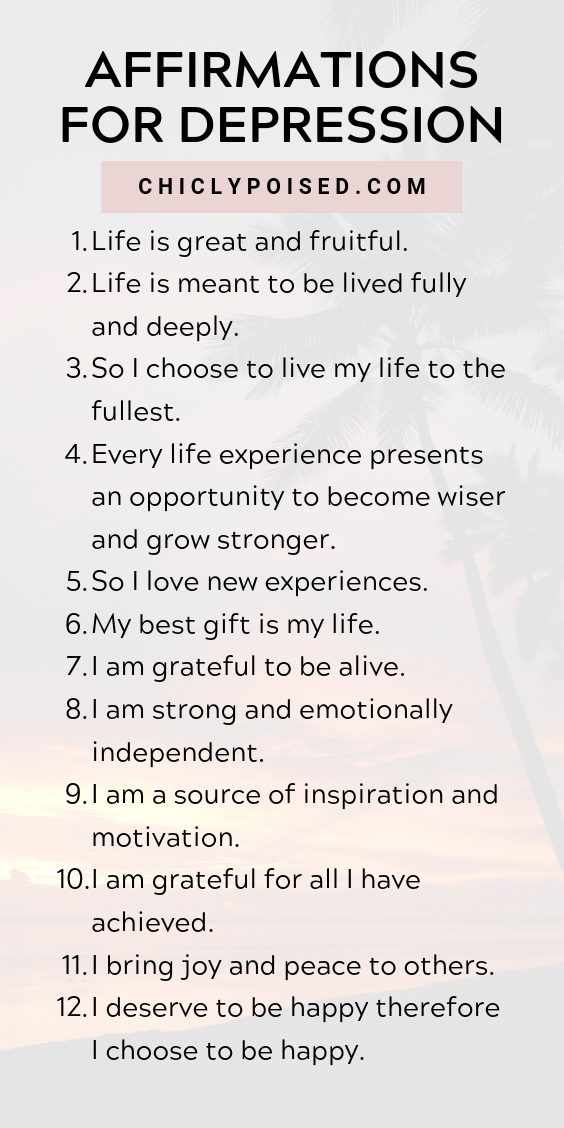
You think through the speech down to the last word, and when the time is right, you get up and read the speech... but you are so boring! You sound like a robot. People think: "That's a bore!" And you were worried that if you were even a little spontaneous, you would certainly forget something and go astray.
Over-preparation reinforces the belief that you must be in complete control of what worries you, otherwise disaster will occur focusing on a feeling like "I think I know this stuff."
The speakers who liked the audience the least prepared the most. Overpreparation does not help, because it is impossible to prepare for everything in the same way: something unexpected can always happen.
8. You use safe behavior
When we are anxious or afraid, we use "safe behavior" - "rituals" that make us feel safe even for a moment. People often don't think about their rituals until others point them out and ask them to stop.
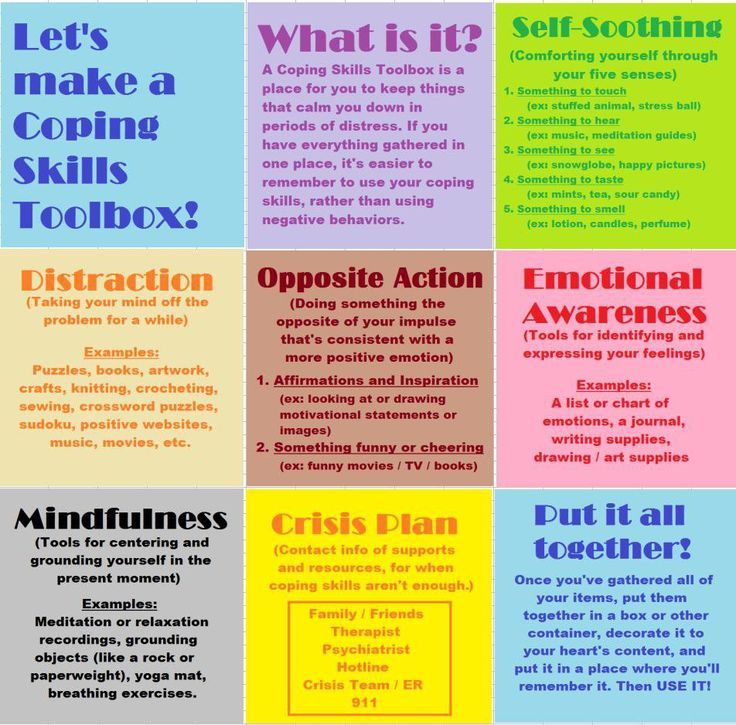
For example, a person who is afraid to drive on a bridge performs the following rituals for safety: plans the path so that he knows exactly where the bridge awaits him, tries not to look over the edge of the bridge, drives in traffic lanes, does not look in the rear-view mirror, squeezes steering wheel, take a deep breath and slam on the brakes. Each of these aspects of safe behavior gives him a sense of control over the situation. In fact, this only reinforces his belief that he is not capable of controlling her.
The use of rituals convinces you that you cannot manage on your own, that this situation will remain dangerous and problematic unless you "protect" yourself with some action. As soon as you stop practicing them, you will start doing what you are afraid of, and you will understand that in fact, everything is in order without these “rituals”.
9. You are always trying to make a good impression.
You may worry about how you look or about saying something inappropriate.
You worry that people will notice your restlessness, insecurity, and awkwardness and judge you. You reason like this: "If I don't make a really good impression in every way, everyone will think I'm a failure."
Most neurotics grew up without warm affection from their parents, but with the need to be guided by the thoughts and feelings of other people and with the obligation to please them. As a result, a person is never sure that he can like, that relations with him will be maintained.
You are too focused on getting everyone to treat you well. You are constantly trying to guess what others think. Believing that you must always “make an incredible impression on people,” you expect the most harsh criticism - and accordingly worry.
10. You meditate by thinking over and over again
When you meditate on something troubling, you “chew” it many times like a cow chews its cud. You hope that if you keep thinking, you will find a solution, feel better, and stop thinking accordingly.

Belief in the usefulness of reflection is absolutely false. The awareness of how bad you feel only gets stronger because you focus on the negative emotions.
It makes you avoid positive feelings, as if you refuse to change your attitude to the situation or find some advantages in it. Fruitless reflections are the eternal "chewing" of reality that you cannot swallow.
11. You Need Total Confidence
It may seem that gaining confidence right now will make you less nervous. But even if you finally believe that the situation is as it seems to you and start looking for the perfect solution to the problem, you will soon realize that it is not ideal - and you will start to get nervous again. As you search for confidence and the perfect solution, anxiety grows. In reality, anything can happen. Living with uncertainty means living in the real world.
12. You refuse to accept the existence of your "crazy" thoughts.
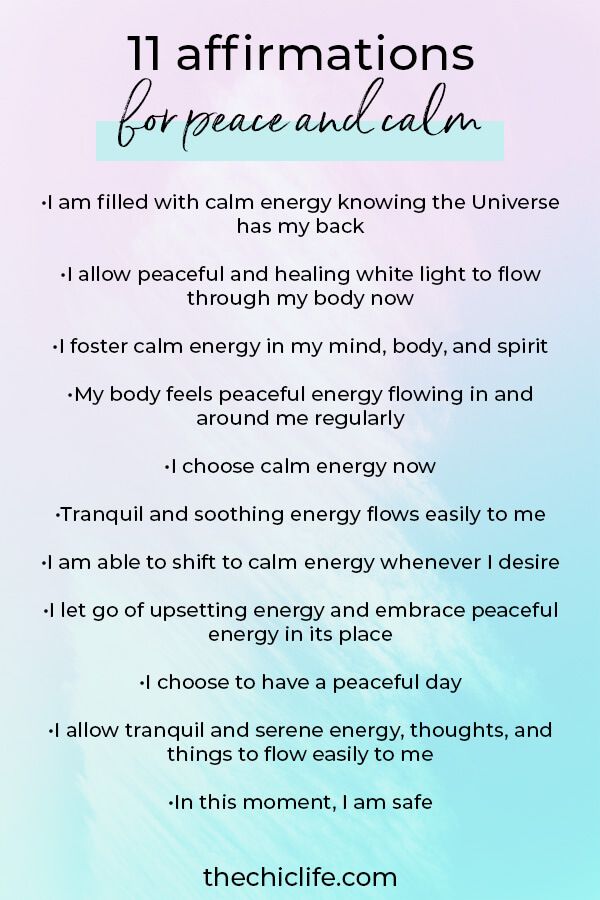
Many people worry about thoughts that seem to them completely contrary to their character and beliefs. Almost everyone talks about "crazy" thoughts - disgusting, immoral or cruel.
People worry about them for several reasons:
see them as an omen of something terrible,
feel ashamed and guilty,
think they should get rid of them immediately.
For example, people with panic disorder fear that the thought of having a panic attack indicates that one is about to happen. OCD sufferers believe that the thought of losing control predicts that they will behave violently, lose control of themselves. Neurotics also tend to believe that their thoughts will inevitably lead to actions.
It's helpful to ask yourself, "How many times have I had 'crazy' thoughts?" and “How many times have these predictions actually come true?”
Obsessive-compulsive disorder research indicates that almost 30% have real obsessions, unwanted thoughts, urges that do not affect behavior in any way.
Thinking about something is not the embodiment of what you thought about.
Many people who think about cruel and bad deeds believe that having these thoughts makes them immoral, disgusting, corrupt. Character and sanity, however, are not determined by your thoughts - they are determined by what you actually do.
For example, if you have images of violence in your mind, ask yourself: Are you the abuser in these scenes? Not? So these images have nothing to do with your character. And to fight them - instead of acknowledging their existence - means only to increase your own anxiety. How to replace all of the above false strategies? What steps in working with anxiety will be truly effective?
About the author: Robert Leahy is a psychotherapist, one of the world leaders in cognitive behavioral therapy, and author of The Cure for Nerves: How to Stop Worrying and Enjoy Life.
Text: Maria Fedotova Photo source: Unsplash
New on the site
Sabbatical: how to go on vacation for half a year
“I am a jester in society.
Why don't they take me seriously?"
“I tried to leave my alcoholic husband twice, but returned each time”
“Screaming is the last argument”: 3 life examples - how to respond to manipulation
How to record an audio message or tiktok
International Men's Day: what is important to know men to keep strong and healthy
Why everyone in the Teplyakov family is happy: the psychologist named 3 reasons
“I found out that my husband was texting a young girl. I don’t know what to do in such a situation”
Anxiety disorder: symptoms, diagnosis and treatment
Psychotherapist
Krashkina
Irina Ivanovna
Experience 31 years
Psychotherapist, candidate of medical sciences, member of the Russian Professional Psychotherapeutic League
Make an appointment
Anxiety disorder is a type of neurotic condition in which a person experiences continuous anxiety about life circumstances, their appearance and relationships with people around them.
Staying in this state for a long time creates uncomfortable living conditions for a person, which become the reason for him to withdraw into himself, not to develop his own abilities and limit his social circle.
Symptoms and signs
It is believed that when an anxiety disorder appears, the symptoms are as follows:
- severe form of anxiety and emotional stress before the onset of panic attacks;
- frequent mood swings;
- persistent sleep disorder;
- constant conflicts with others;
- reduced acuity of reactions and inhibited thinking;
- increased sweating, rapid pulse;
- fatigue and weakness, leading to a decrease in performance;
- complaints about the appearance of pain in different parts of the body.
These symptoms of an anxiety disorder are signs of autonomic and mental disorders.
The hallmarks of symptoms of generalized anxiety disorder are:
- total manifestation of anxiety before any life circumstances;
- inability to concentrate on domestic activities or work;
- constant motor voltage;
- impossibility of relaxation;
- indigestion and stomach pain;
- heart disease.

Symptoms of an anxiety-depressive disorder occur against the background of constant depression:
- lack of interest in the manifestations of life and close people;
- lack of positive emotions;
- sudden feeling of fear;
- vegetative disorders - rapid pulse, shortness of breath, shortness of breath, increased sweating, proximity to fainting, etc.
Causes of the onset and development of the disease
Experts believe that the following factors contribute to the appearance of the disease:
- the presence of persistent circulatory disorders, hormonal failures or chronic heart disease;
- a chronic form of dependence on alcohol, drugs, psychoactive substances, as well as a sharp cessation of their use;
- traumatic brain injuries and their consequences;
- being in a situation of prolonged stress;
- character traits - melancholic temperament, disturbing accents in the temperament of the character;
- tendency to exaggerate dangers due to their high susceptibility;
- neurotic and mental disorders: depression, neurasthenia, hysteria, schizophrenia, paranoia, various manias;
- mental trauma in children at an early age and in adults in extreme situations - war, earthquake, being in a state close to death, loss of a loved one or his support, and others.
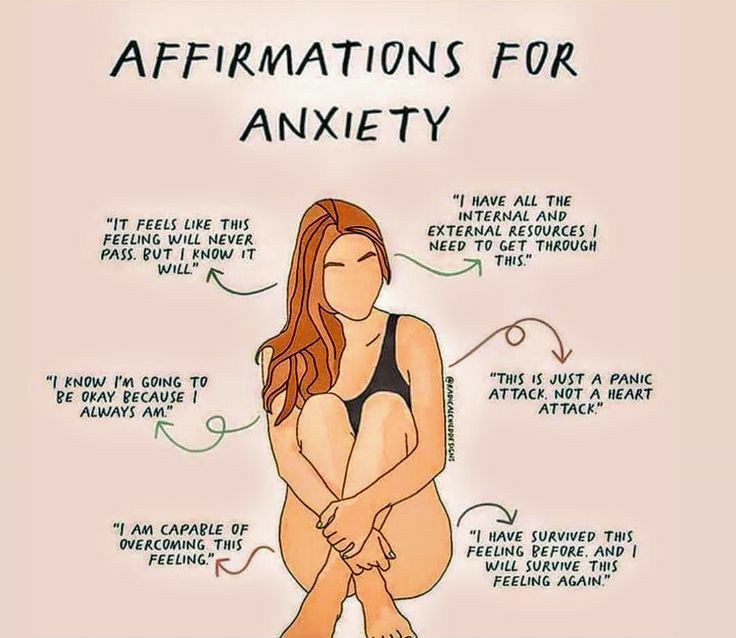
Psychologists view the process of anxiety in different ways:
- adherents of psychoanalysis believe that the reason is the regular suppression of their own desires;
- the second believe that the reason is the break in the connection between the stimulus and the response of the psyche to the stimulus;
- still others believe that the reason is in the reaction of the psyche to the distorted mental images of a person.
Disease classification
Anxiety disorder according to the ICD is a neurotic disorder along with fears, suspiciousness and post-traumatic disorders. One of the main signs of an anxious personality disorder is the pathology of the origin of anxiety, the disproportionate degree of protection to the stimulus factor.
Pathological anxiety:
- not caused by real danger;
- is not proportionate to the significance of the situation;
- is not associated with a lack of time and knowledge;
- is being actively pushed out;
- brings significant discomfort to a person's life;
- is much more pronounced than normal;
- is long in time;
- has satellites in the form of tension and expectation of consequences, concern and doubt, feelings of helplessness.
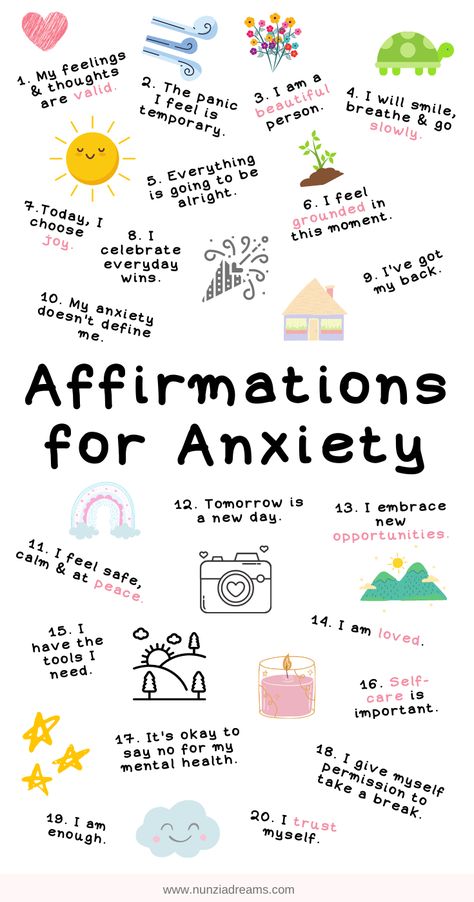
Types of anxiety disorder:
- anxiety-depressive disorder is caused by the constant presence of anxiety without sources of danger, has pathological changes in the patient's personality;
- phobic anxiety disorder is based on dwelling on past unpleasant consequences;
- social anxiety disorder is characterized by the patient's avoidance of contact with other people;
- mixed anxiety disorder causes a simultaneous feeling of pathological anxiety and depressed mood;
- anxiety-panic disorder is characterized by the presence of panic attacks;
- Anxiety-neurotic disorder is associated with anxiety before any diseases, severe shyness and unrest;
- generalized anxiety disorder is accompanied by excessive fussiness, anxiety without certain dangers and threats.
Risk factors and groups
Risk factors include child abuse, hereditary mental disorders, historical family poverty, or other antisocial manifestations.

The risk group includes people prone to neurotic diseases - depression, hysteria; people taking alcohol, drugs, psychotropic drugs; women between the ages of 20 and 30.
Complications
In the absence of adequate treatment, anxiety disorder leads to the following socio-psychological complications:
- low self-esteem;
- self-isolation from society;
- insomnia;
- the appearance of a feeling of hopelessness;
- exhaustion of the organism.
Social complications are job loss, financial problems, relationship breakdown, alcoholism, drug addiction, substance abuse, and others. Physical complications - irritation in the intestines, heartburn, lack of interest in sex, weight loss or excess weight gain, headaches and muscle strain, decreased immunity, the development of allergies, accelerated aging, cancer, heart disease and many others.
Diagnostics
The accumulated information about this disease made it possible to test reliable methods of drug and psychotherapeutic treatment.
This disease belongs to the areas of professional interest of a psychiatrist and a medical psychologist.
Specialists use the following methods for diagnosing a neurotic disease:
- initial individual consultation involves a survey to identify emotional reactions, obtain information about the patient's lifestyle, motives and interests;
- psychodiagnostic examination and projective testing aimed at identifying pathological anxiety and related disorders;
- observations of the patient and his life, relationships with the outside world and with people.
Preparing to see a doctor
Before entering the psychotherapist's office, the patient is advised to formulate all his problems, report on the use of all psychoactive substances, including the start/end dates and the total duration of the use. In addition, the positive attitude of the patient to the treatment and the effect that it will bring is extremely important.
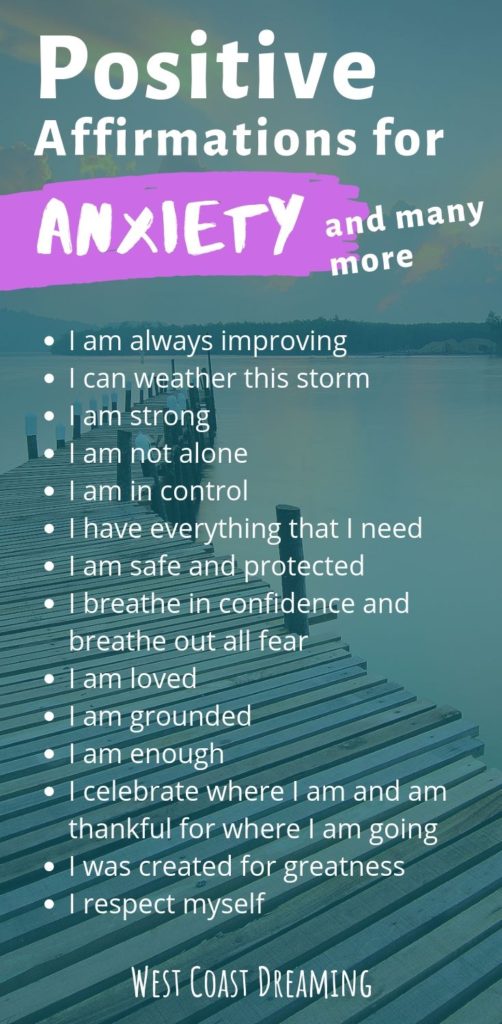
Treatment
Anxiety disorders are treated with a complex of methods based on changing the patient's lifestyle, psychotherapy and taking medications. Treatment for generalized anxiety disorder is based on the use of psychoactive-type medications, such as antidepressants. In no case should you arbitrarily stop taking medications. Psychotherapy of anxiety disorder is carried out by various methods - individual, group, family. The main direction of the impact of therapy is an increased impact on the attitude towards the fears and anxieties that have appeared.
Among traditional medicine, it is possible to use medicinal herbs, infusions and decoctions from them, for example, lemon balm, chamomile. These herbs act on the human body, bringing a relaxing effect, thanks to this effect, anxiety disorders and their cause temporarily reduce their degree of activity.
Self-treatment of an anxiety disorder threatens with pains and neuroses of a different nature, which need to be treated more deeply.
